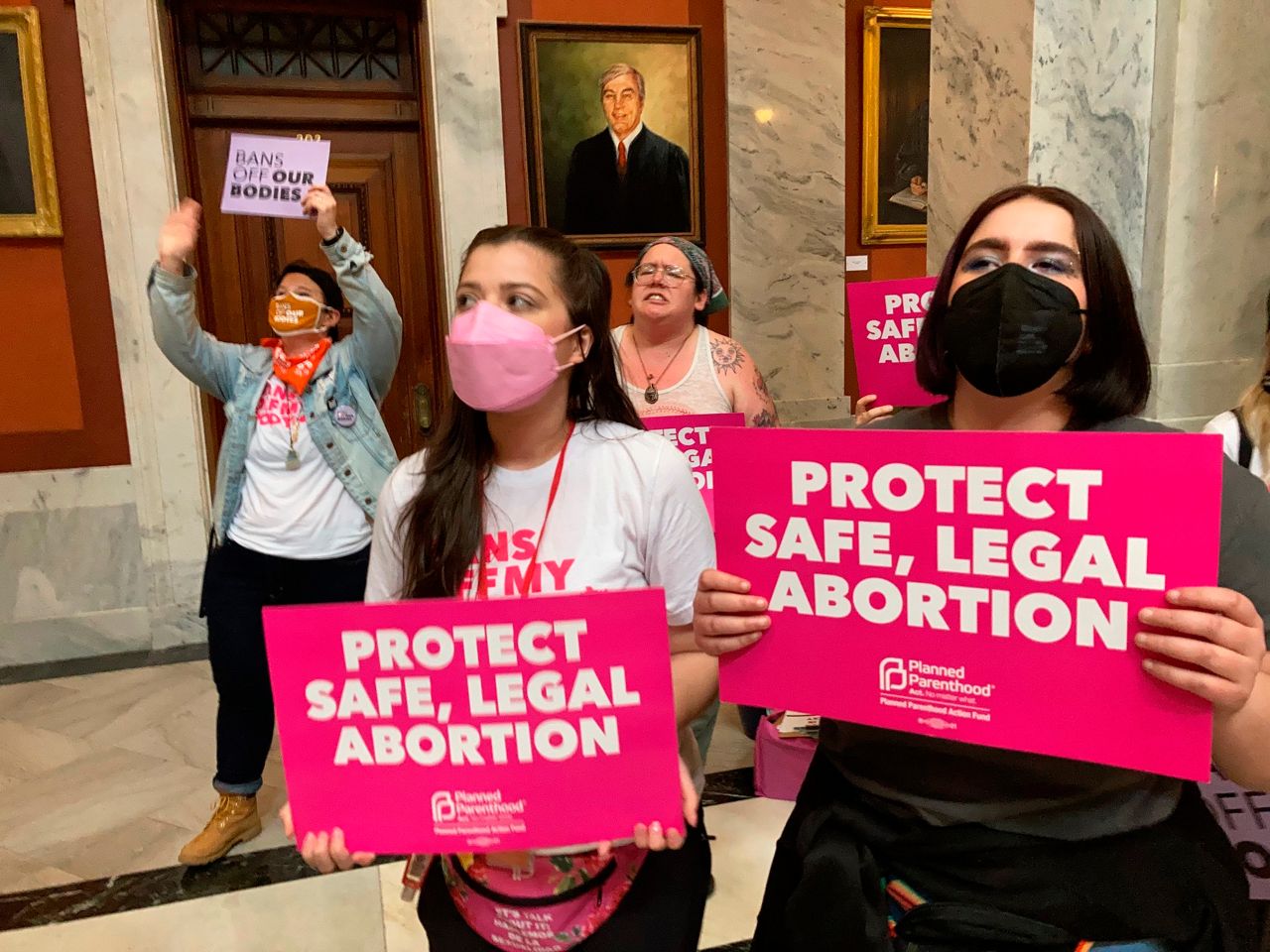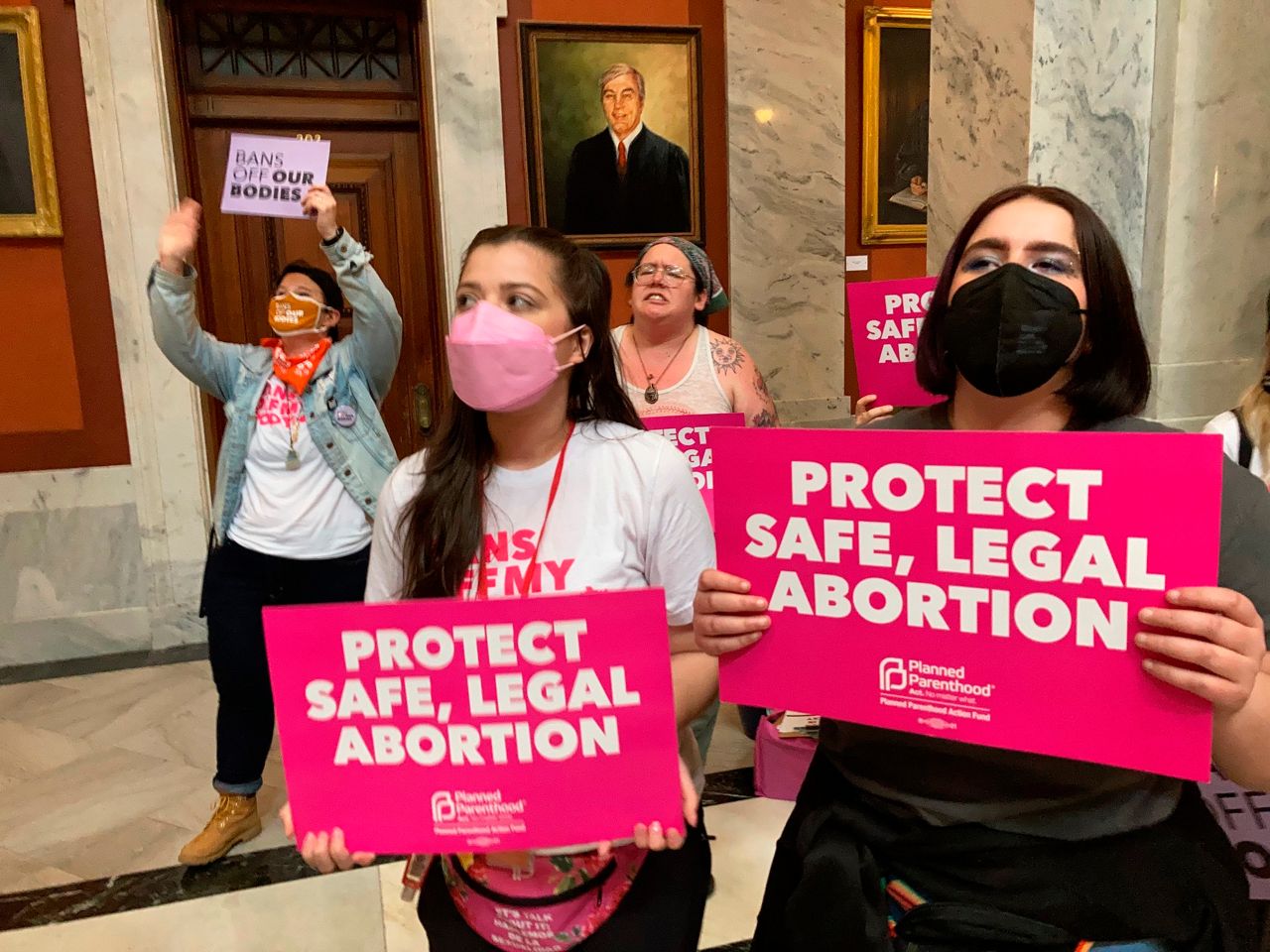A handful of Republican-led states have near bans on abortion that would go into effect if the Supreme Court decides to reverse the landmark 1973 Roe v. Wade case, which protects for a woman’s right to abortion, thanks to so-called “trigger laws,” some of which have been on the books for nearly two decades awaiting such a moment.
A draft Supreme Court opinion, obtained and published by POLITICO on Monday, contained a preliminary ruling from Justice Samuel Alito that Roe was “wrong from the start” and must be “overruled.” Chief Justice John Roberts has since confirmed the authenticity of the report, although said it did “not represent a decision by the Court of the final position of any member on the issues in the case.”
“Trigger laws” are designed to be enacted if the U.S. Supreme Court strikes down the federal precedent that granted the right to seek an abortion. According to the Guttmacher Institute, 13 states already have such laws that would ban abortion in varying degrees if triggered.
Some would take effect immediately, while others include waiting periods ranging from a few days to a month after Roe is stricken down.
Even more states would likely create legislation to ban or severely restrict abortions after the final Supreme Court decision hold true to the draft, per the Guttmacher Institute.
Roe currently defines fetal viability as the “interim point at which the fetus becomes […] potentially able to live outside the mother’s womb,” typically between 24 – 28 weeks of gestation. Many states ban abortion before that definition of viability, at 20 weeks after fertilization, or about 22 weeks of gestation — the time since the patient’s last menstrual period.
Arkansas
Arkansas Gov. Asa Hutchinson signed the state’s “triggered” abortion ban into law in early 2019, after a majority-Republican legislature passed the measure. The law would ban all abortions except for medical emergencies if the Supreme Court overturns Roe v. Wade.
In Arkansas, abortion is currently banned after 20 weeks of pregnancy except in the case of rape, incest or compromised patient health. A federal judge in July 2021 blocked the latest attempt to restrict nearly all abortions in the state.
Idaho
Idaho lawmakers passed the state’s so-called trigger provision as part of a “fetal heartbeat” bill signed into law in 2020. If triggered by a ruling rejecting Roe precedent, it would ban all abortions except in the case of rape, incest or to protect the life of the mother. It would take effect 30 days after a Supreme Court opinion is handed down.
Idaho became the first state to pass a law similar to Texas’ ban on abortions after about six weeks of pregnancy, which allowed regular citizens to enforce the ban with lawsuits. It was blocked by the state’s Supreme Court before it was set to go into effect last month.
For now, abortions are legal until a fetus becomes viable, which is defined as between 24 and 28 weeks of pregnancy.
Kentucky
Abortion would be banned immediately in Kentucky if Roe is overturned, according to a law that became final in 2019.
Just on Monday, a federal judge extended a ban on a newer Kentucky law that essentially made abortions because the state’s last two abortion clinics said they could not comply with the new requirements listed in the law. It also sought to ban abortions after 15 weeks and require women to consult with a doctor before receiving an abortion pill.
Democratic Gov. Andy Beshear’s veto of the law was overturned by a Republican legislature. The law is blocked until at least May 19. Currently, abortion is banned after 20 weeks if pregnancy, except in the case of a risk to a mother’s health.

FILE – Abortion-rights supporters chant their objections at the Kentucky Capitol on Wednesday, April 13, 2022, in Frankfort, Ky., as Kentucky lawmakers debate overriding the governor’s veto of an abortion measure. (AP Photo/Bruce Schreiner, File)
Louisiana
Louisiana’s trigger law will also go into effect immediately upon any decision to strike down Roe v. Wade, and it will ban any abortions except those that are necessary to save a mother’s life.
It was enacted in 2006.
Currently, abortion is legal up through the 20th week of pregnancy.
Mississippi
Mississippi’s near ban on abortion after 15 weeks of pregancy is the law at issue in the Supreme Court case that could ultimately lead to the end of Roe v. Wade.
It was the third state to pass a trigger law when it did so in 2007, according to Mississippi Today, allowing a ban on abortions within 10 days of a Supreme Court decision except in the case of rape and risk to a mother’s life.
While the case over its 15-week ban is decided in Washington, current Mississippi law allows abortions through 20 weeks of pregnancy.
Missouri
Missouri’s trigger law was passed in 2019 and would ban all abortions if the Supreme Court were to overturn Roe, with no exceptions for rape or incest. The only exception would be in the case of a medical emergency.
Missouri has some of the most restrictive laws among states, and it only has one abortion clinic left. In 2019, state legislators sought to ban abortions after eight weeks of gestation, but that was blocked in court.
State lawmakers now want to pass a new, sweeping law that would criminalize mail-order abortion pills, defund Planned Parenthood and allow wrongful death lawsuits from family members if a baby is born after an attempted abortion and is then injured or dies.
Abortions are currently legal through 20 weeks of pregnancy in Missouri.
North Dakota
North Dakota first approved its “trigger law” in 2007 that would ban abortions in most instances, should the Supreme Court overturn Roe. The law would provide limited exceptions in the cases of pregnancy caused by rape, incest or “sexual imposition,” or when determined by a medical professional to be “necessary […] and was intended to prevent the death of the pregnant female.”
Individuals who perform an abortion, other than the pregnant person, can face a felony charge.
The law is intended to be “effective on the date the legislative council approves by motion the recommendation of the attorney general to the legislative council that it is reasonably probable that this Act would be upheld as constitutional.” Abortion is currently legal in the state up to 20 weeks after fertilization.

FILE – Christy Zentz testifies before the Senate Judiciary Committee at the Capitol in Bismarck, N.D., Tuesday, March 13, 2007, in favor of legislation that would prohibit abortions in North Dakota, except to save the life of the mother. (AP Photo/Will Kincaid)
Oklahoma
Oklahoma has made a number of steps to further restrict abortion in recent weeks, including updating a “trigger law” that was already on the books to fully ban the procedure if or when the Supreme Court “overrules in whole or in part” either Roe v. Wade or Planned Parenthood v. Casey.
One law, signed by Oklahoma Gov. Kevin Stitt, is set to take effect in August, and would criminalize all abortions except “to save the life of a pregnant woman in a medical emergency.” It does not include exceptions for rape or incest, and medical providers could face a felony punishable by up to 10 years in prison or a $100,000 fine.
While there will likely be legal challenges to the restrictive laws, it is possible that by the time the near-total ban is set to go into place, Roe v. Wade may no longer be the law of the land.
South Dakota
South Dakota’s so-called “trigger law” has been prepared for nearly two decades, having passed the conditional House Bill 1249 in 2005 to ban nearly all abortions statewide “effective on the date” that the Supreme Court turned the abortion debate back to the states.
The law would prohibit all abortions unless “there is appropriate and reasonable medical judgment that performance of an abortion is necessary to preserve the life of the pregnant female.” Those in violation of the law would face a Class 6 felony charge.
Gov. Kristi Noem tweeted she would “immediately call for a special session to save lives and guarantee that every unborn child has a right to life in South Dakota” following the release of the POLITICO article on Monday, although the ban was designed to go into effect automatically.
Abortion is currently legal in the state up to 20 weeks after fertilization.
Tennessee
Tennessee Gov. Bill Lee signed the “Human Life Protection Act” in 2019, which would ban nearly all abortions in the state 30 days after the Supreme Court should overturn Roe v. Wade.
The bill would ban all abortions except when “necessary to prevent the death of pregnant woman or prevent serious risk of substantial and irreversible impairment of major bodily function.” Women seeking abortions would not be criminally prosecuted, while doctors who perform the procedure could face felony charges.
Currently, abortions in Tennessee are only legal before a fetus is deemed viable, or in the case of likely death or serious injury to the mother.
Texas
Texas already has one of the nation’s strictest laws against abortion, having passed the Heartbeat Act last year, which prohibits abortions when a fetal heartbeat can be detected – typically around six weeks of gestation.
Last June, Texas also adopted House Bill 1280, which would ban all abortions – with no exceptions for rape or incest – beginning at the moment of conception. It includes limited exceptions if the life of the mother is at stake, or if there is risk of “substantial impairment of major bodily function.”
Should an “unborn child” die as a result of an abortion, doctors who perform the procedure could face a first degree felony, punishable by up to a $100,000 fine and life in prison.
The bill would be enacted within 30 days of the Supreme Court overturning Roe.
Utah
In March 2020, then-Gov. Gary Herbert signed a sweeping provision into law that would restrict abortions in nearly all cases as soon as the Supreme Court overturns Roe v. Wade.
The law would have limited exceptions, including high likelihood of the mother’s death or a “serious risk of substantial and irreversible impairment of a major bodily function,” or should two physicians submit, in writing, that the fetus has a lethal defect or that the woman is pregnant as a result of rape of incest. Individuals who, under the new law, illegally terminate or assist in the termination of a pregnancy could face second-degree felony charges, punishable with up to 15 years in prison and a $10,000 fine.
Currently, abortions in Utah are allowed only until the fetus is “viable” or in the event that the life of the mother is in danger, or of an irreversible fetal anomaly. The authorized clinics in the state perform abortions up to 21 weeks and 6 days after an individuals’ last period.
Utah’s current Gov. Spencer Cox said the law signed by his predecessor would “govern if the high court decides to overturn Roe.”
“We anxiously await the court’s actual ruling in this case,” he added.
Wyoming
In one of the nation’s more recent adoptions of a “trigger law” statue, Wyoming Gov. Mark Gordon on March 15 signed a law that would ban abortions in his state within five days of the Supreme Court overturning Roe v. Wade.
The law would change a number of aspects of Wyoming’s abortion law. Currently, abortions are allowed up until “the embryo or fetus has reached viability,” with except in cases “when necessary to preserve the woman from an imminent peril that substantially endangers her life or health, according to appropriate medical judgment.”
Should the Supreme Court strike down Roe v. Wade, abortions at any point in the pregnancy would only be allowed in the state in cases of preserving a woman “from a serious risk of death or of substantial and irreversible physical impairment of a major bodily function, not including any psychological or emotional conditions, or the pregnancy is the result of incest […] or sexual assault.”




